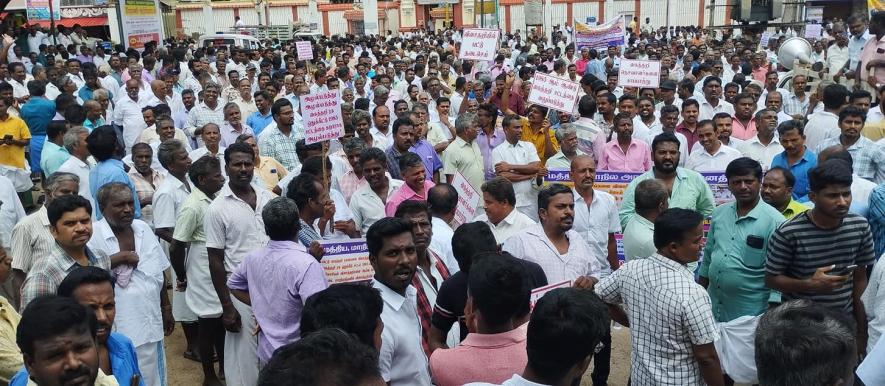TN: Unique Arani Handloom Silk Weavers are Out of Work, Powerloom Overpowers

Handloom weavers await response from Commission. Image courtesy: CITU, Tamil Nanu
Scores of weavers gathered outside the Commissioner's office at Arani on July 10, demanding protection of the handloom silk weaving industry in Tiruvannamalai district. More than 5,000 people participated in the procession, which started from Arani Dharmaraja temple grounds and marched to the office.
The protesting weavers said that due to the non-observance of handloom law, more power loom sarees are produced in the Arani and Cheyyar circles of Tiruvannamalai district. Due to this, handloom silk sarees remain unsold, they say.
Section 5 of the Handlooms (Reservation of Articles for Production) Act, 1985 reads, “Where an order has been made under section 3 reserving any article or class of articles for exclusive production by handlooms, such article or class of articles shall not, on and from the date of reservation, be produced by any loom, other than handloom.”
Therefore, to protect the handloom silk industry, which provides employment to lakhs of weavers, the production of power looms should be stopped, they demanded. The handloom weavers complained that the power loom owners are producing various sarees with the Geographical Indicator (GI) tag, so handloom sarees remain unsold. “Appropriate action should be taken against power loom owners who violate the law,” they said.
As plenty of sarees have stagnated with the procuring middlemen, the latter have not supplied silk to the weavers and given orders for weaving handloom silk sarees. Due to this, the weavers have been suffering from unemployment for the past few months.
The unemployed weavers emphasised the demand to sell unsold silk sarees through cooperatives and textile trading companies.
Following the protest, the Arani Handloom Silk Producers and Weavers Federation leaders met the revenue commissioner M Dhanalakshmi and submitted a memorandum of their demands. She promised that appropriate action would be taken after consultation with the district collector to restrict the production of power loom silk sarees in the region.
Thousands of families are involved in the weaving industry in Arani, Cheyyur, Marusoor, Kamakkur, Agaram, Arayalam, S V Nagar, Munugapattu, Onnupuram, Devikapuram and Meyyur villages of Tiruvannamalai. Together with its sub-workers, about one lakh people depend on this industry for their livelihood.
The traditional Arani silk saree received a GI tag for its special territory-linked characteristics. GI registration offers the product statutory immunity against unauthorised claims and imitations of the unique weaving tradition behind these products.
There are three types of Arani silk, and the distinctive features of the fabric include extensive zari work, intricate designs and twisted yarn.
Get the latest reports & analysis with people's perspective on Protests, movements & deep analytical videos, discussions of the current affairs in your Telegram app. Subscribe to NewsClick's Telegram channel & get Real-Time updates on stories, as they get published on our website.
























